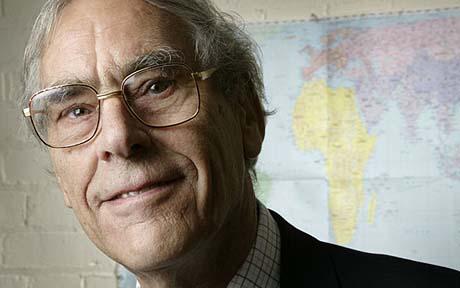It was in 2007, at an event at the Institute for Global Health at the UCL, I sat on a table at the back of the lunch room with my sandwich. On my table, I met an elderly English gentleman in a sweater who asked my name, and we did the usual small talk. He was a bit frail and spoke of his days in Nigeria with warmth and affection. He spoke about how his work in Nigeria was the first time the measles vaccine was tested in West Africa. In truth I did not take him seriously, but all the same I got back and searched for his work on PubMed…..and I found 2 links:
Measles in Nigeria: Am J Dis Child. 1962 Mar;103:230-3
The severe measles of West Africa. Proc R Soc Med. 1964 Sep;57:846-9.
These articles are so old that abstracts are not available on Pubmed, so I ordered them from our library. At that point I understood the depth of this man’s work in Nigeria! At this time, 40 years after his work in Nigeria, we are still experiencing outbreaks of measles, and children continue to die. I then invited him to a conference we organised on health in Nigeria, in London in November 2008. He did not reply to my emails, or letter in the post. Now I know why….
Professor David Morley, died at the age of 86 on the 2nd July 2009. A paediatrician whose life was dedicated to transforming the chances of survival of children born in the developing world.
We asked a dear friend; Bryan Pearson, Publisher of Africa Health to provide some insight into David’s amazing contribution to our country….his piece;
Sad news from the UK last month was the announcement of the passing of Professor David Morley, aged 86, ex head of the Institute of Child Health, and founder of the remarkable Teaching Aids at Low Cost (TALC) charity which had provided millions of slide sets and books all over the world… and still does. His seminal book ‘Paediatric priorities in developing countries’ is still a standard text. In many respects he was the father of Primary Health Care… and his origin of his work? Nigeria.
In the mists of time, many forget that his inspiration was from working from the Wesley Guild Hospital (WGH), Ilesa, in the old Western Region back in the 1950s and early 60s. His pioneering work in the local Imesi-Ile community revolutionised global child health. It is just sad to reflect that such landmark developments which were completely ‘made in Nigeria’ were adopted internationally, but largely ignored in the country of their birth.
The process commenced when the then senior doctors at Wesley Guild, Drs Andrew Pearson and John Wright were discussing the huge caseload of acute paediatric cases and resolved that surely much of this could be prevented if appropriate measures were instituted in the community. To a degree they had brought the problem on themselves having negotiated a deal with their new regional Governor, Chief Awolowo to provide free health services for under 18’s. Awo’s administration agreed to pay three shillings per patient. Not surprisingly, attendance surged.
Undeterred, Dr Pearson approached the West African College of Medical Research (WACMR) in Yaba and obtained funding for an expatriate to come out and spend half their time on community-based child health research, and half their time on clinical duties. Dr David Morley was recruited.
Quickly he made his mark. A survey of the population of Imesi-Ile village was undertaken, which revealed that 450 children out of every 1000 was dying before the age of five years. A full longitudinal study was initiated and over the next 18 months all children born into the community were registered… and then followed with monthly checks for a full five years. Growth charts were introduced (now utilised universally) and a special ‘Under Fives Clinic’ was initiated back at WGH. High protein weaning food was introduced. Mothers kept the children’s records (less loss than for hospital based records); Grade II midwives were taught to deal with 90% of clinical need and to refer the other 10%. By 1960 outpatient attendance had reached 200 000 at WGH, 80% of whom were under 18 year olds. The first measles vaccine was trialled at Ilesa and Imesi-Ile in 1960…
And thus the community-based health revolution was born. Quickly the Imesi-Ile population started growing at more than 9% per annum, and the first family planning programme (as it was known then) had to be initiated.
It is no accident that Prof Olikoye Ransome-Kuti was closely involved and inspired by David Morley. Just a shame, that despite all Olikoye’s efforts, so little of what was learned from this landmark work of community-based prevention was adopted throughout the Federation. Many other countries did take heed, and probably millions of children have benefitted.
READ A MOST ENLIGHTENING MEMORIAL IN THE TELEGRAPH
Every year our country gives its national awards to all sorts of characters. People that really affect the lives of people are hardly eve honoured. But what greater honour can we do for David than if we did finally saved our children from measles …nearly 50 years after his seminal work! Well…thats our country..its up to us!
Never doubt that a small group of thoughtful committed people can change the world; indeed it is the only thing that ever has…Margaret Mead

